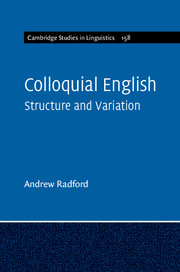4 - How come?
Published online by Cambridge University Press: 09 June 2018
Summary
Introduction
How come … is used in colloquial English to ask for the reason for some event or state of affairs. Duffield (2015: 61) notes that it differs from why in that how come is ‘a more colloquial expression’, noting that ‘It is hard to to imagine, for instance, a prosecuting barrister asking a defendant “How come you rang Jane Price on four separate occasions, Mr. Fox?”’ For speakers of standard varieties of English, how come seems to be acceptable when followed by a finite TP containing an overt subject (bold-printed below) – as in the following pop song lyrics:
(1) a. How come you never go there? (Feist)
b. How come you are always off your head, and yet you still end up in your bed? (Courteeners)
c. How come you're not here? (Pink)
d. So how come no-one loves me? (Beatles)
Some speakers also allow the use of the complementiser that after how come, as in the following (internet-sourced) examples:
(1) a. How come that an infinite universe will collapse under gravity? (physics.stackexchange.com)
b. How come that hi-tech companies still shun digital marketing? (vickie.wordpress.com)
c. How come that you don't believe in us? (lyrics to song Believe in us by Jay-Jay Johanson)
d. How come that you can't see through windows during the day? (amp.reddit.com)
There are also speakers who allow (Interrogative Subject-Auxiliary) Inversion after how come, as in the examples below (3a being attributed to Diane Lillo-Martin in Ochi 2004, 3b, c being examples from a corpus cited by Kim & Kim 2011, and 3d being sourced from the internet by me):
(1) a. How come won't you be here tomorrow?
b. How come does iodine get into the human system of dwellers along the coasts from sea water?
c. Now, how come did you give those baby-sitters such a hard time?
d. How come is it that even ugly women my age can get a boyfriend but I am still single? (web)
- Type
- Chapter
- Information
- Colloquial EnglishStructure and Variation, pp. 216 - 292Publisher: Cambridge University PressPrint publication year: 2018



